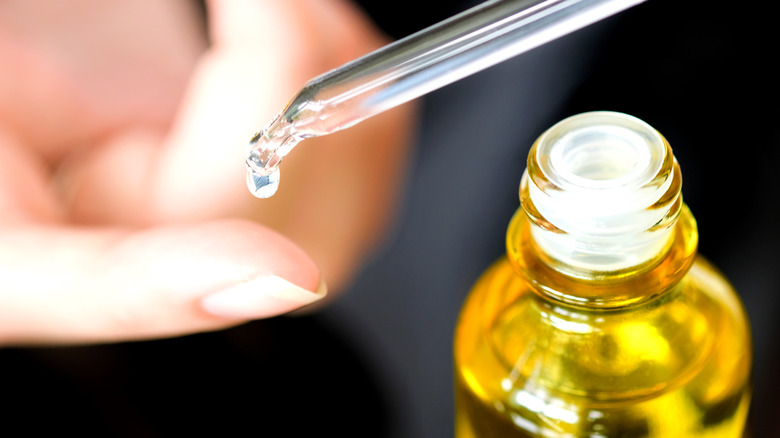The Real Benefits Of Vitamin E Oil
Vitamin E is an important nutrient found in sunflower seeds, almonds, spinach, red bell peppers, and avocados, according to the Harvard T.H. Chan School of Public Health. There are eight forms of the vitamin, but Alpha-tocopherol is the one that best meets the needs of humans, per Healthline. The vitamin is mainly known for its antioxidant qualities, which means that it helps fight the damage caused by free radicals. According to a 1995 review published in the Australian and New Zealand Journal of Ophthalmology, free radicals harm healthy cells and contribute to several chronic conditions such as heart disease, asthma, type 2 diabetes, degenerative eye disease, and cancer; vitamin E may help defend against at least some of these conditions.
A 2018 study published in the Diabetology & Metabolic Syndrome Journal showed that vitamin E may be helpful when it comes to controlling complications caused by type 2 diabetes. Other evidence published in a BMC Musculoskeletal Disorders 2017 study demonstrated that daily doses of vitamin E helped reduce oxidative stress symptoms in osteoarthritis patients. Given the benefits of vitamin E as a disease-fighting antioxidant, what else can it do in oil form?
Vitamin E oil has its benefits too
Vitamin E oil is a supplement with differing concentrations, according to Medical News Today. You can apply vitamin E oil directly to the skin, and it boasts several benefits. Some claim that vitamin E oil can help prevent wrinkles, but there is limited research to back that up. However, moisturized skin is less dry, and therefore doesn't show wrinkles as much as dry skin, so it may look better, per Medical News Today. Other assertions claim that vitamin E oil can help wounds heal, but there is also limited evidence to back this up. Furthermore, there is little research proving that the oil can treat skin conditions that cause itching. That being said, it may offer relief from itching since it moisturizes dry skin.
While many people can use vitamin E oil without issues, some have an allergic reaction to it. Always test the oil on a small patch of skin before applying it because if you do have an allergy to it, it could make symptoms worse, per Medical News Today.


